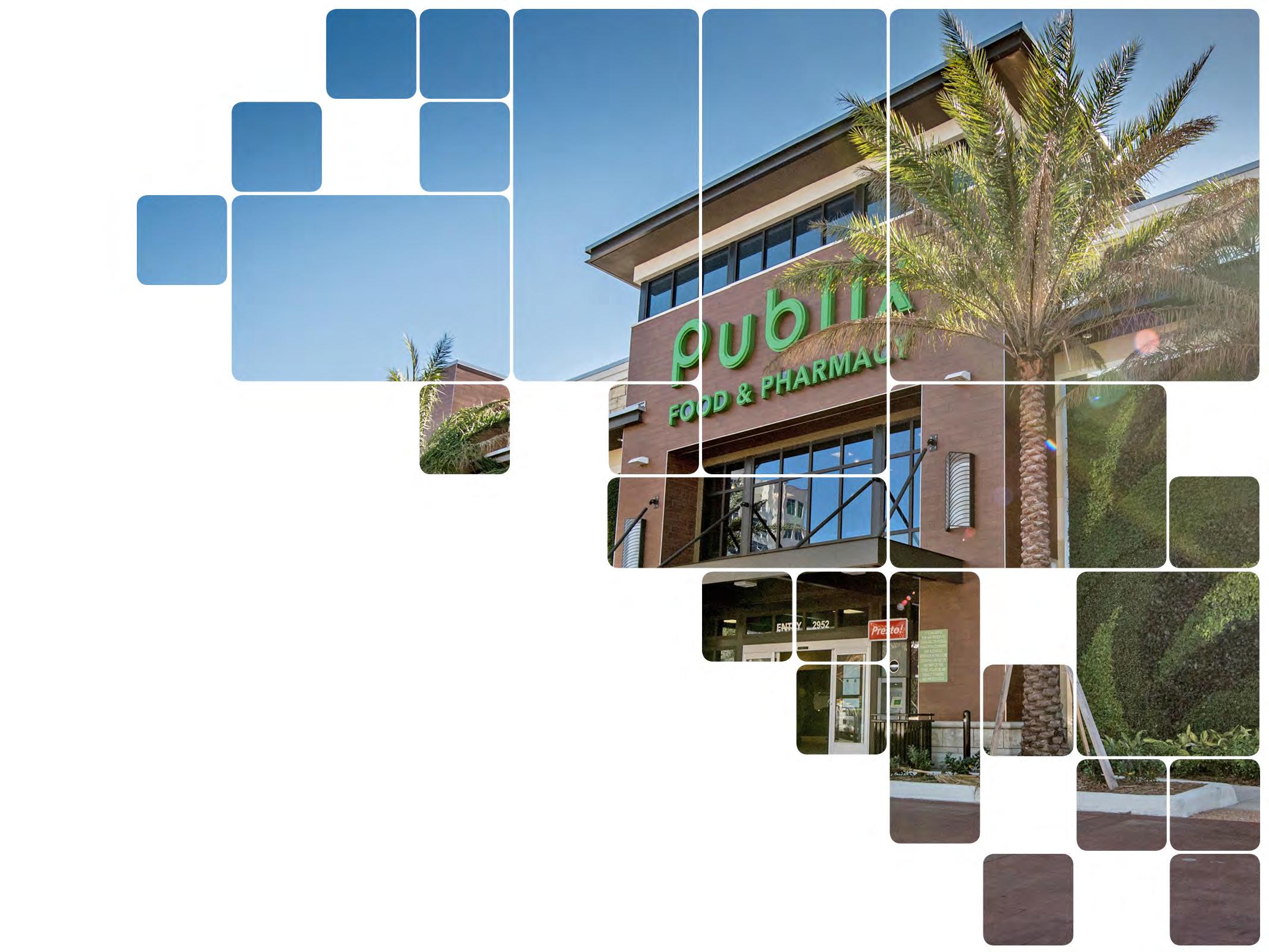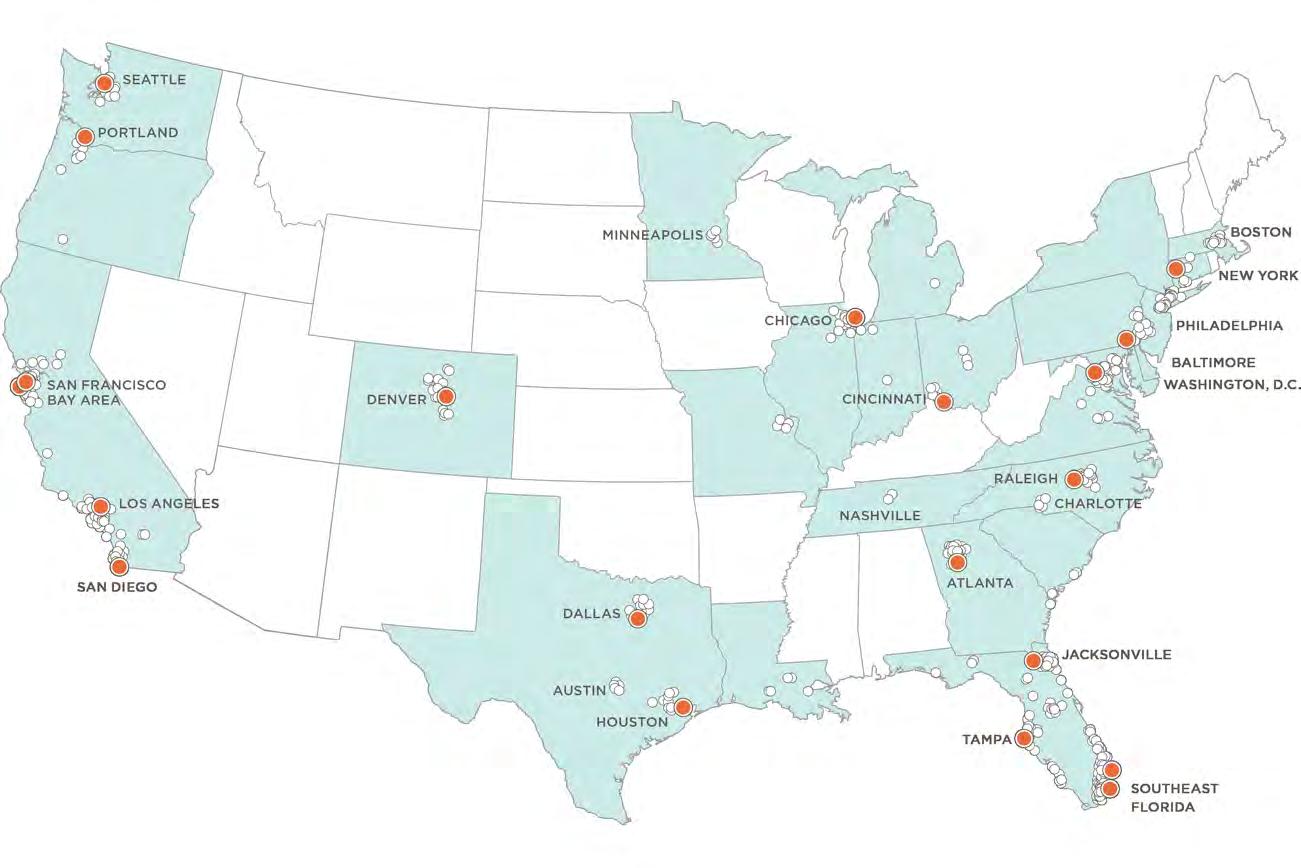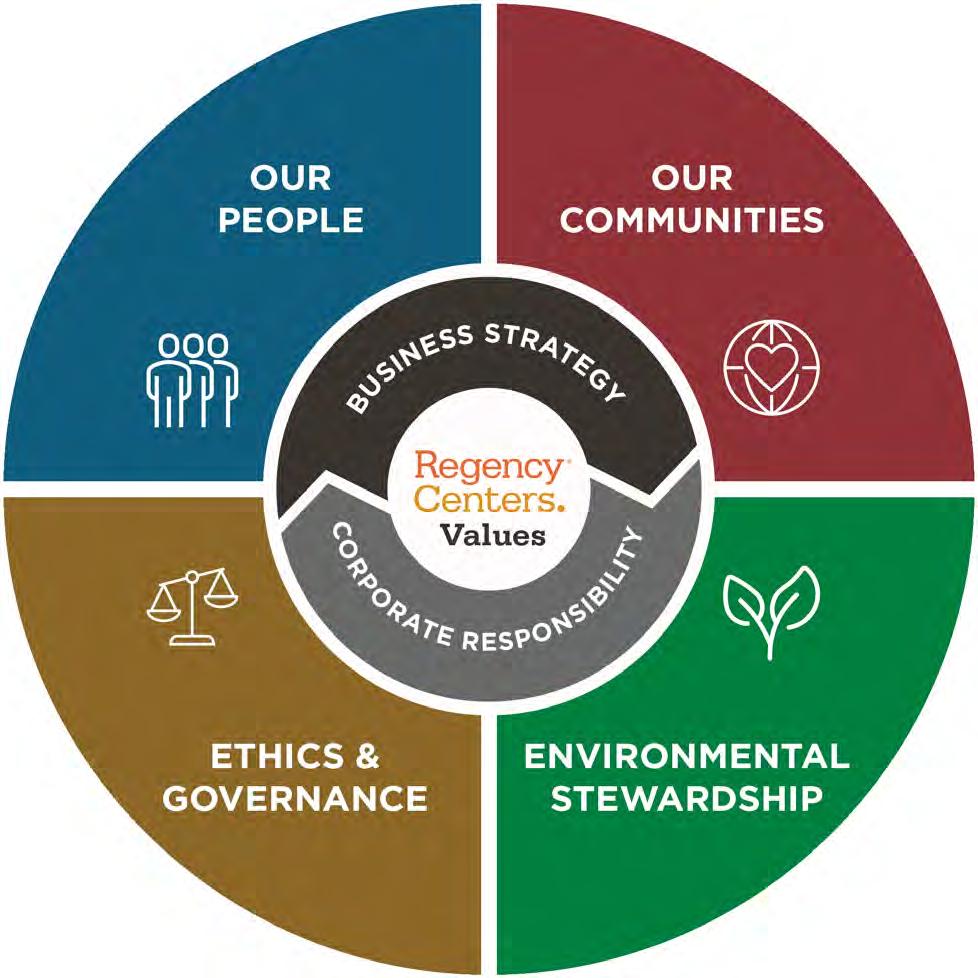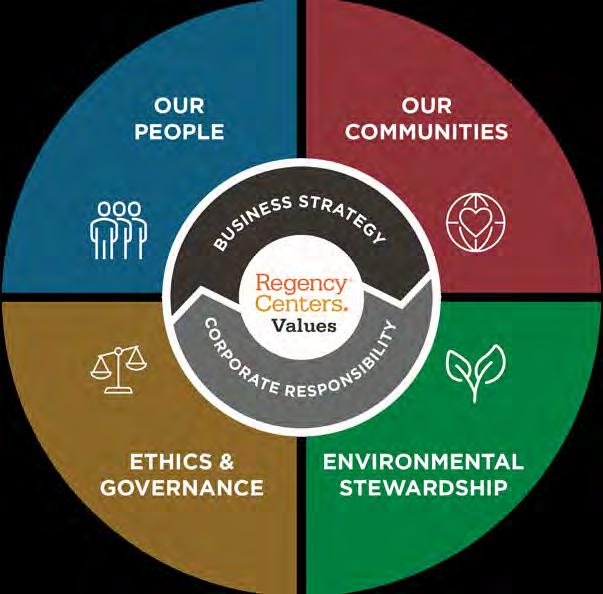
10 minute read
Regency Overview
About Regency

The Market at Springwoods Village | Houston, TX
Regency Centers (REG) is the preeminent national owner, operator, and developer of neighborhood shopping centers. With more than 400 retail properties, our premier national portfolio totals nearly 60 million square feet. Our properties are located in affluent and densely populated trade areas of the U.S., differentiated by outstanding quality, breadth, and scale.
In 2017 we marked an important milestone: the merger with Equity One and the successful integration of our two companies. This business combination has met or exceeded all of our high expectations. After closing in March, Regency joined the S&P 500 Index and is now the country’s largest shopping center REIT. Now more than ever, our platform provides for sizeable scale benefits, including operational efficiencies, relative cost of capital, and significant value creation opportunities.
Our sector-leading portfolio, located in the nation’s most attractive markets, continues to draw successful retailers and shoppers while generating impressive same-property NOI growth. Regency’s platform currently spans 21 market offices, giving us an unequaled local presence and deep connection to the communities we serve. Property management, leasing, construction, and investment activities are conducted in each of these regional offices.
Regency’s unrivaled combination of in-process and pipeline projects, plus key tenant and local relationships, creates significant value through the development and redevelopment of high-quality shopping centers. Our track record is impressive with more than $1 billion in project starts in the last five years alone.
Through our capital allocation and funding strategies, we have continued to maintain balance sheet strength. This combination of unequaled strategic advantages has positioned Regency to produce sector-leading total shareholder returns.
About Regency
Headquarters
Jacksonville, FL
$16B
Market Capitalization
21
Market Offices
59M
SF GLA
443
Employees
95.3%
Leased
PROPERTIES REGIONAL OFFICES

Information as of 12/31/2017
426
Properties
9,000
Tenants For more information:
About Regency
regencycenters.com/regency
Board of Directors
investors.regencycenters.com/corporategovernance/board-of-directors
Leadership
regencycenters.com/regency/leadership
Annual Reports and Proxy
investors.regencycenters.com/financialinformation/annual-reports
Property Portfolio
regencycenters.com/properties
In Development
regencycenters.com/in-development
Corporate Governance
investors.regencycenters.com/corporategovernance/governance-overview
Investor Relations
investors.regencycenters.com
Regency’s Approach to Corporate Responsibility


Our People: Our people are our most fundamental asset. They are the best professionals in the business, and each one brings our unique culture to life through their actions. This culture allows our employees to live our values on a daily basis to ensure that our business aligns with our corporate responsibility strategy. Our efforts in maintaining and enhancing a safe and pleasant work place include employee well-being and empowerment with a focus on health and benefits, training and education, safety and diversity. When people are passionate about their work and feel connected to their teams, they perform better. Our highly engaged team is a critical component in achieving our strategic objectives.
Ethics and Governance: We do what is right. As stewards of our investors’ capital we place great emphasis on integrity and transparency. Since Regency was founded more than 50 years ago, we have based our business policies on the highest ethical principles. We are committed to best-in-class corporate governance practices. This promotes long-term value creation for our stakeholders, a strong culture of business compliance, and full transparency in our reporting. Our Communities: It is crucial that we better the communities where we operate, live and work by connecting our thriving shopping centers directly to our neighborhoods. We are long-term owners of our shopping centers with a local office presence in every major market of operation. Regency’s professionals live in the communities we serve. Philanthropy and giving back to these communities are cornerstones of what we do and who we are.
Our local market teams customize our centers; bringing merchants and shoppers together to shop and dine in vibrant community gathering places.
These centers utilize distinctive designs that emphasize convenience, visibility, and connectivity.

With a complete in-house real estate team, we have the expertise to operate, develop, and redevelop our centers. This includes merchandising with a mix of retailers that attract shoppers, create jobs, and enhance the local business environment. These investments result in positive impacts for our merchants and communities while providing significant value creation and earnings growth for our shareholders.
Environmental Stewardship: Regency is committed to identifying and implementing sustainable business practices to minimize our environmental impact and position our assets for long-term success. Our approach to environmental stewardship focuses on integrating management responsibilities across our development and operations business units. This addresses material environmental topics such as air pollution, climate change, and resource scarcity. We accomplish this by focusing on these five strategic priorities: green building, energy efficiency, greenhouse gas emission reductions, water conservation, and waste management.
About This Report
We prepared this report using the framework of the Global Reporting Initiative (GRI) Standards, the most widely used guidelines for corporate sustainability reporting. This report has been prepared in accordance with the GRI Standards: Core option.
Stakeholder Engagement
To own, operate, and develop successful shopping centers, we at Regency Centers must engage with a wide variety of stakeholders including shareholders, bondholders, lenders, employees, joint venture partners, tenants, and the local communities where our properties are located. Considering the needs and feedback of these stakeholders is crucial to the value-creation process as they are often vested in our projects and are in a position to significantly influence long-term success.
Shareholders, Bondholders, and Lenders
Regency’s Capital Markets and Investor Relations team engages year-round with shareholders, bondholders, and lenders. In addition to frequent communication, this team also hosts headquarters visits, property tours, and non-deal road shows. These equip stakeholders with Regency-specific knowledge that empowers them to decide where to allocate their capital. Furthermore, we aim to host Investor Days every two to three years to offer additional opportunities for investors and analysts to engage with our management team. As a member of the National Association of Real Estate Investment Trusts (Nareit) and the International Council of Shopping Centers (ICSC), Regency interacts with stakeholders at each industry group’s respective conferences. By annually updating the Investor Relations Strategic Plan, with consideration of feedback provided by investor perception studies, we are able to set targets, objectives, and measurable goals that reflect and address concerns and feedback voiced by key stakeholders.
Employees
Our employees are offered a variety of channels to voice their feedback, including an annual employee engagement survey, employee review meetings, quarterly town hall meetings, and Q&A sessions with Regency’s Operating Committee. Employees also participate in special projects and training workshops that allow them to directly influence business processes and systems. Most importantly, our unique culture fosters an open-door policy that encourages employees to express suggestions, opinions, and concerns without requiring a formal channel. Through these avenues, employees are empowered to speak up about how Regency can continue to enhance our special culture by keeping employees engaged.
Joint Venture Partners
While the majority of Regency’s properties are wholly-owned, we do have partnerships with best-in-class institutional investors and developers. We seek to ensure all parties have aligned strategies, values, and similar investment objectives. Proactive engagement with partners is a priority for our Joint Venture Portfolio Management team. Among these engagement mechanisms are annual meetings, quarterly leasing calls, monthly financial calls, and property tours. By maintaining a continuous dialogue with our partners, we are able to monitor and address any issues that may arise. Increasingly, large institutional partners are inquiring about and taking Regency’s ESG initiatives and programs into consideration.
Tenants
Our in-house Property Management team maintains daily contact with tenants and conducts frequent property inspections. Our team facilitates an annual tenant survey that solicits input on property operations, sustainability initiatives, and marketing programs. Before implementing a new tenant-marketing program we host a series of focus groups across the country to acquire feedback from existing and potential tenants. These efforts serve as powerful aspects of maintaining and increasing tenant satisfaction across our portfolio.
Communities
We engage our communities through open houses, town halls, and an active social media presence. Through these channels we can provide communities with information that ensures our shopping centers support their interests and needs. Sentiment and feedback conveyed through social media and continued dialogue with local agencies and community groups allow us to assess the effectiveness of these efforts. There is also great importance placed on our engagement with local and regional planning agencies, municipal boards, and permitting authorities to ensure projects are initiated in compliance with local regulatory requirements. All of this is done through our local offices in conjunction with corporate support.
STAKEHOLDER GROUP LEVEL OF ENGAGEMENT
Shareholders, Bondholders and Lenders Organizational Level
Employees Individual Level
Joint Venture Partners
Tenants Organizational Level
Organizational Level/ Asset Level
Communities Project/Asset Level ENGAGEMENT APPROACH One-on-one meetings with individuals and institutions through headquarter visits, property tours and non-deal road shows Direct dialogue through Regency-hosted
Investor Days and quarterly earnings conference calls
One-on-one engagement and annual satisfaction surveys Direct dialogue through employee review meetings, quarterly town hall meetings and Q&A sessions with the
Executive Committee
Dedicated Joint Venture Portfolio
Management team Proactive and regular one-on-one dialogue Interactions facilitated via industry associations and sell-side analyst conferences Direct feedback through perception studies Information sharing via company filings
Open door policy that encourages employees to offer opinions or raise concerns informally Special project and training workshops Formal reporting mechanisms to raise issues such as fraud, harassment, etc.
Direct dialogue through property tours, monthly financial calls, quarterly leasing calls, and annual meetings
One-on-one contact with tenants performed by in-house Property Management team Direct contact with national, regional and local retailer representatives Direct feedback via annual tenant survey and focus groups
One-on-one dialogue with local and regional planning agencies, municipal boards, permitting authorities and community groups Direct dialogue through open houses and town halls Monitoring via social media TOPICS OF DISCUSSION
Company goals and strategic objectives, performance and expectations, transparent disclosure, corporate governance, other ESG initiatives
Employee satisfaction, benefits and compensation, health and safety, career development and training, diversity and equal opportunity
Property performance and expectations, ESG initiatives
Tenant performance, tenant satisfaction, property maintenance, property health and safety, property efficiency and sustainable building practices
Project-specific information, community interests and needs, curated merchandising and placemaking
Materiality
This Regency Centers Corporate Responsibility Report aims to present a balanced and concise analysis of our management and performance related to material issues.
1.Identification
Material issues can impact our company’s ability to achieve its strategic objectives and remain commercially sustainable, as well as socially and environmentally responsible. We identify material issues through gathering investor feedback, performing environmental impact studies, and conducting surveys of employees, tenants, partners, vendors, board members, and others including peer-benchmarking.
2.Assessment
We assessed the extent that material issues impact Regency’s value chain and their importance to our stakeholders to determine their relevance within this report. While all of the topics were relevant to our own operations, many were found to be relevant to upstream stakeholders (primarily suppliers), to downstream stakeholders (mostly customers and the public) or, in some cases, to both.
3.Focus Areas
Material topics were identified, forming the basis for the content of this report. For clarity, these topics were consolidated into categories as outlined to the right:
The following areas are identified as material to our stakeholders and our business:
Marketplace
Direct economic impacts, includes financial performance
Our People
Employees Diversity, equal opportunity, and non-discrimination Health and safety Training and education
Our Communities
Indirect economic impacts, includes philanthropy and real estate development and improvements Public policy Customer health and safety
Ethics and Governance
Corporate Governance Ethical business, includes anti-corruption and anti-competitive behavior
Environmental Stewardship
Sustainable building practices Energy and greenhouse gas emissions Water conservation Waste management




